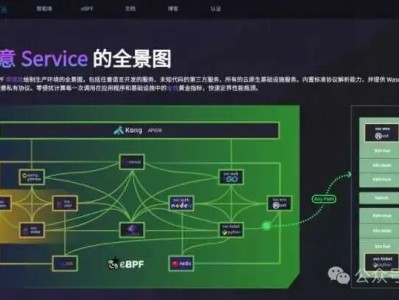看《小猪佩奇》Peppa Pig 学英语——捉迷藏 Hide and Seek
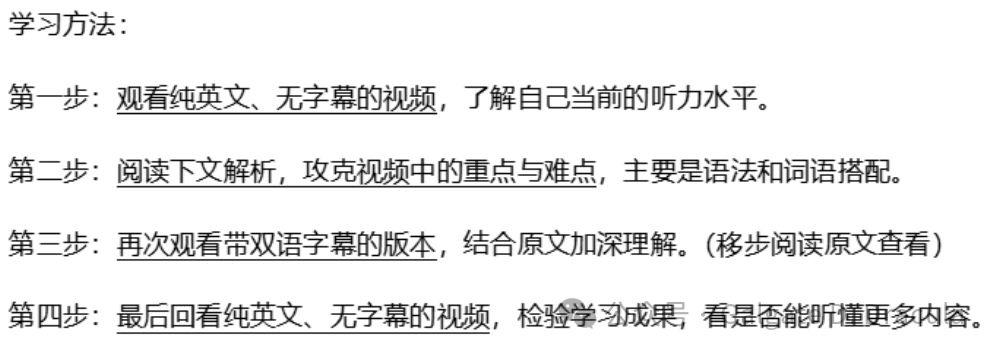


Hide and seek.
捉迷藏
内容概要:在这一集中,佩奇和乔治玩起了捉迷藏。乔治轮到他藏的时候,一开始藏得并不好。佩奇在家里到处找他——桌子底下、窗帘后面、玩具篮里——却哪儿都找不到。最后,佩奇才发现,乔治一直躲在猪爸爸的报纸后面!
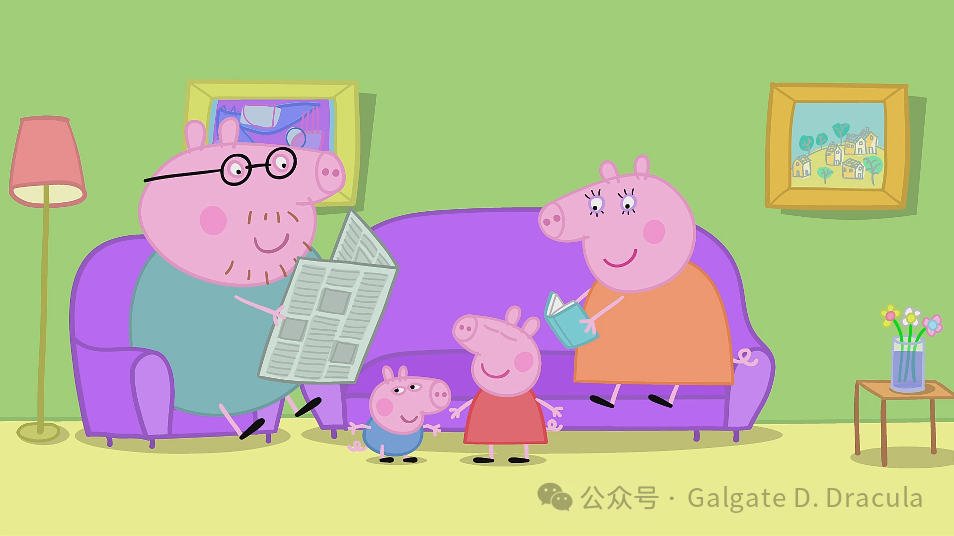
Peppa and George are playing hide and seek. It is George's turn to hide. He must quickly find somewhere to hide before pepper finishes counting. One, Two, Three, Four, Five, Six, Seven. George has found somewhere to hide just in time. Nine, Ten.
佩奇和乔治在玩捉迷藏,现在轮到乔治藏了,他必须赶快藏起来,佩奇就要数完了。一、二、三、四、五、六、七、八。乔治正好在佩奇数完之前藏了起来。 九、十。
hide and seek 意为“捉迷藏”;
It's someone's turn to do sth. 表示“轮到某人做某事”;例如:It's Daddy's turn to cook today.(今天轮到爸爸做饭。)
must + 动词原形 表示“必须”;have to + 动词原形,也表示“不得不,必须”。
somewhere to hide = “一个(可以)躲藏的地方”,不定式 (to do) 常用来修饰 somewhere / something / someone,表示“用来……的”或“可以……的”。类似的表达还有 someone to talk to → 可以说话的人
just in time 意为“正好及时”。
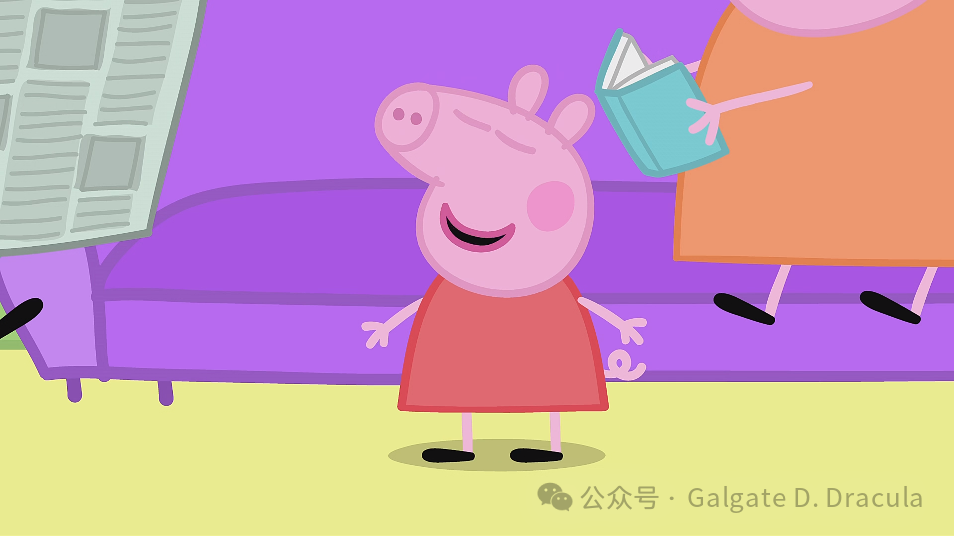
Ready or not? Here I come.
准备好了吗?我来找喽。
Ready or not? 是一种省略句,完整句是:Are you ready or not?(你准备好了没有?)
Here I come. 是一种倒装句。正常语序是 I come here,但口语中倒装表示语气更强、更自然。
例如:Ready or not, here we go!(准备好了没,我们要开始啦!)

Peppa has to find where George is hiding. Found you. Peppa has found George. George. I could see you too easily.
佩奇要找到乔治藏在哪?找到了。佩奇找到了乔治。乔治,我一眼就看到你了,太容易了。
Peppa has to find where George is hiding. has to + 动词原形,必须做某事,where George is hiding 是宾语从句(where 引导)。
Found you!:找到了!(捉迷藏中常用表达)
too easily 表示“太容易了”,语气带点责备或调皮。
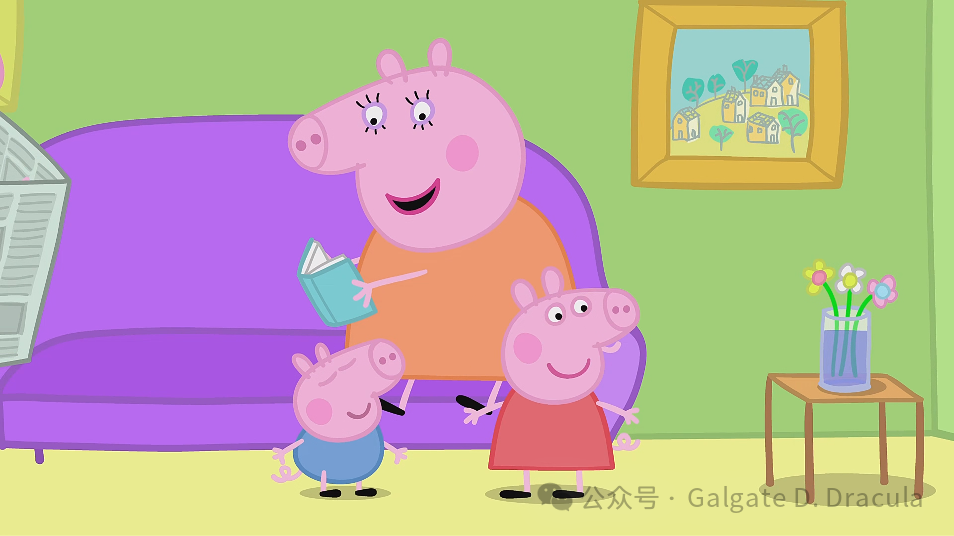
Now it is pepper's turn to hide. One, three. I'll help George to count. One, Two, Three, Four, Five, Six, Seven, Eight, Nine, Ten. Okay, George, open your eyes.
现在轮到佩奇藏了,一、三,那我来帮乔治数数,一、二、三、四、五、六、七、八、九、十。好了,乔治,睁开你的眼睛吧。
help sb. to do sth. 表示“帮助某人做某事”,视频中乔治年龄还太小,不会数数,所以妈妈帮他数数,不定式 to count = “数数”。
open your eyes:睁开眼睛,数数数完了,妈妈让乔治睁开眼睛。
例句:Close your eyes. Now open them!(闭上眼,再睁开!)
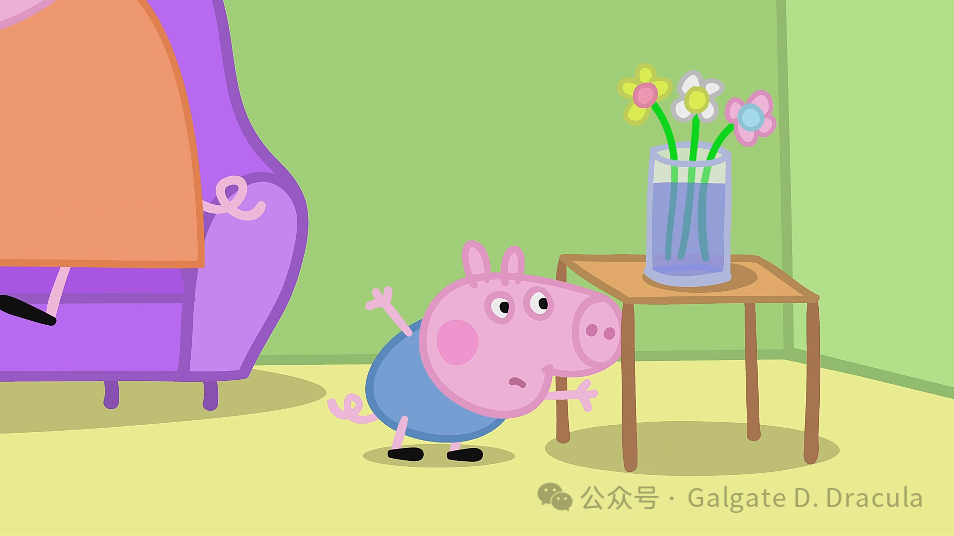
George has to find where pepper is hiding. Peppa isn't hiding under the table.
乔治要找到佩奇藏在哪儿?佩奇没有藏在桌子底下。
宾语从句:where Peppa is hiding(佩奇藏在哪里),where 引导从句作 find 的宾语。
is not hiding under the table. 表示正在进行的动作“没有在桌子下躲藏”。
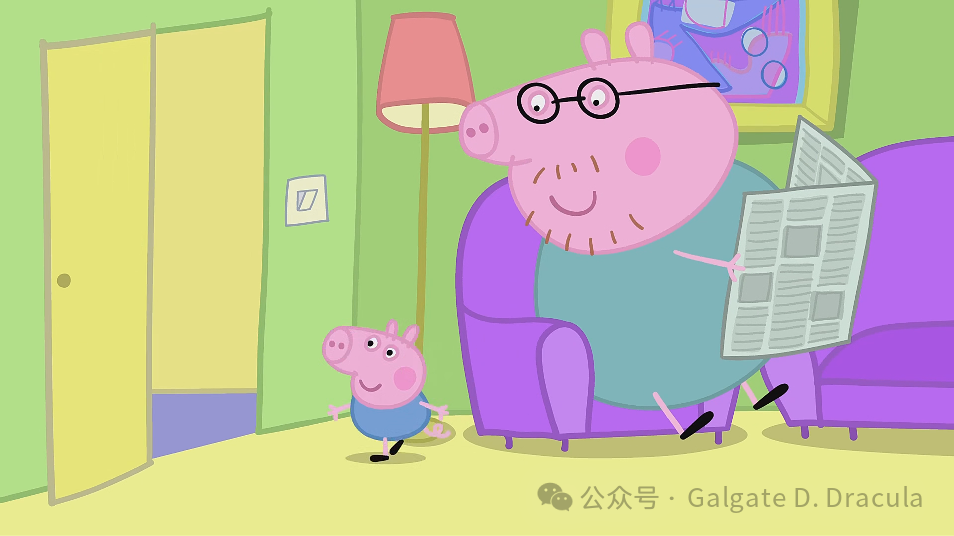
George, have you thought of looking upstairs?
乔治,你猜她会不会藏在楼上呢?
have you thought of...:现在完成时,你有没有想过……。think of doing something 表示“想到 / 考虑做某事”;还可以说 think about doing something. 表示“认真考虑,琢磨某事”。
looking upstairs:到楼上去找(look upstairs = 往楼上看 / 去楼上看看)
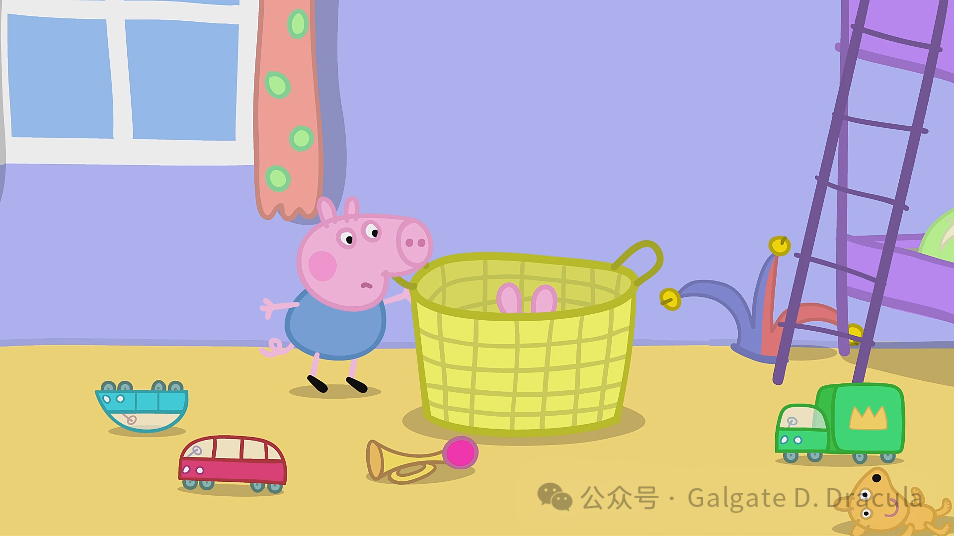
Peppa isn't under the bed. What was that strange noise? Pepper isn't behind the curtain. There is that strange noise again? What can it be? George has found where Peppa was hiding.
佩奇也没有藏在床底下,刚才那是什么声音?佩奇也没有藏在窗帘后面,乔治又听到了那个奇怪的声音,到底是怎么回事呢?乔治终于找到佩奇藏在哪了。
strange 形容词,表示“奇怪的”。
noise 名词,表示“噪音,吵闹声”;noisy 形容词,表示“吵闹的”。
under the bed:在床下;behind the curtain:在窗帘后面;以及视频后面出现的 in the toy basket. 在玩具篮里。这三个介词短语都是表示地点,且都用了定冠词 the,用来特指躲藏的地方。
What can it be? “那会是什么呢?”(can 表示推测,语气带神秘感)
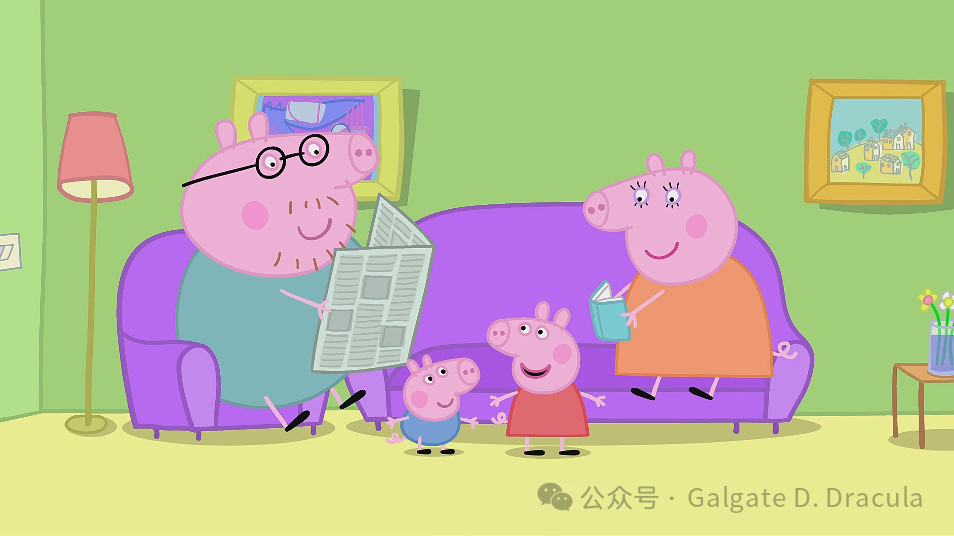
George found me. Now is daddy's turn to hide. Oh, I think George should have another turn. But George isn't very good at hiding. I'm sure he'll be better this time. Close your eyes and start counting. One, Two.
乔治找到我了,现在该轮到爸爸去藏了。我觉得该让乔治再来藏一次,但是爸爸乔治好像不太会藏,我相信他这次一定会藏好的。闭上眼睛开始数数吧。一、二。
be good at doing sth.:擅长做某事。例:He’s good at swimming.(他擅长游泳。)
I think George should have another turn. (我觉得乔治该再来一次。)“should + 动词原形”,意思“应该做……”, 表示建议或推测。
be sure (that)……,表示“确定……”,“一定……”。例如:I'm sure that he is right. 我确定他是对的。
be better this time:这次会更好。this time 这一次,next time 下一次。
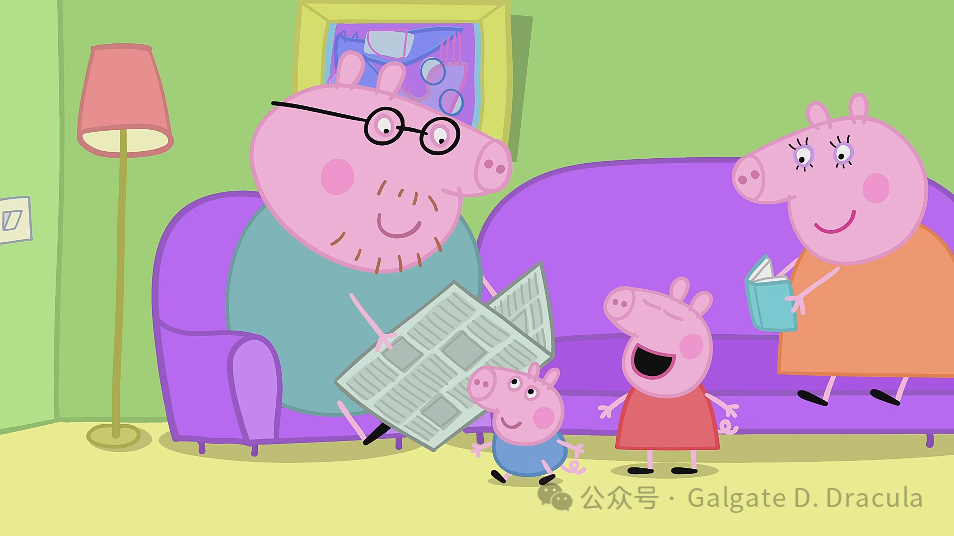
Oh, dear. Pepper will easily find George. George, come over here.
哦,糟糕,这样乔治会很快被佩奇找到的。乔治快到这来。
Oh, dear:表示轻微的担心、遗憾或无奈,像中文的“哎呀”“糟了”。
come over here:过来这边。
区分:come over here 和 go over there.
come over here(过来这边) = move toward me(向我这边过来)
go over there (到那边去)= move away from me(去别的地方,远离我)
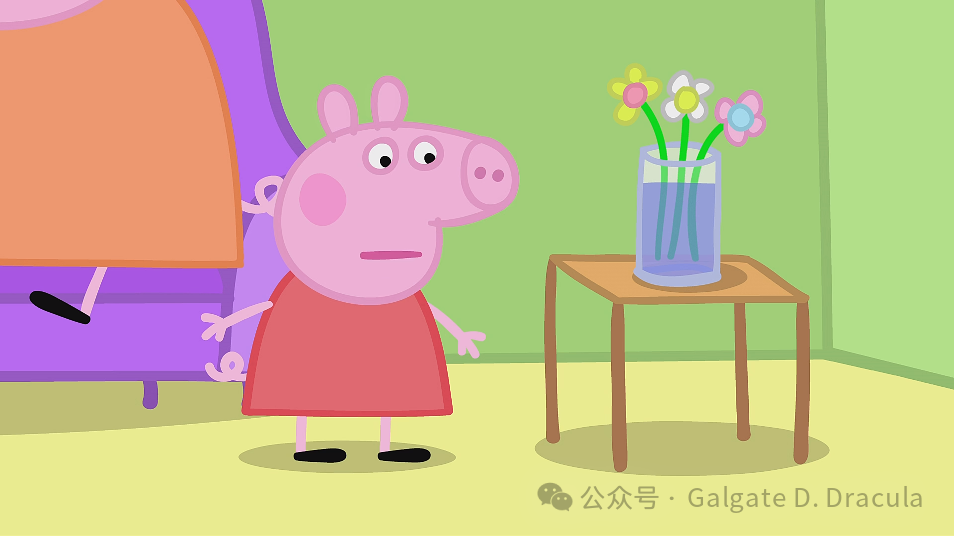
Seven, Eight, Nine, Ten. Ready or not? Here I come. Oh, George isn't hiding under the table. But George always hides under the table.
八、九、十,藏好了吗?我来找你喽。哦,乔治这次没有藏在桌子底下。但是乔治每次都是藏在桌子底下的。
always 频度副词,表示“总是,一贯地”。
频度副词按照发生频率大小排列的的顺序如下:
always 总是 >usually 通常 > often 经常 > sometimes 偶尔 > seldom / rarely 很少见 > hardly ever 几乎从不 > never 从不。
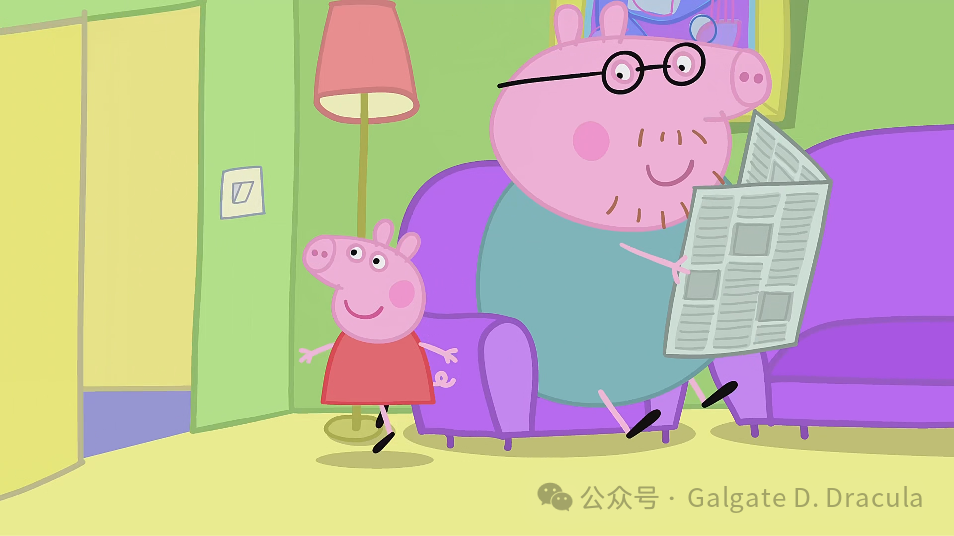
Have you thought of looking upstairs? I know where he is. George is in the toy basket.
你觉得他会不会藏在楼上呢?我知道他在哪了,乔治肯定藏在玩具篮里了。
toy basket 名词短语,玩具篮子。
upstairs 副词,表示“在楼上”,downstairs 也是副词,表示“在楼下”。

Oh. George is not in the toy basket. Where can he be? Peppa cannot find George anywhere.
乔治没有藏到玩具篮里,他到底在哪呢?佩奇,哪都找不到乔治。
anywhere 任何地方,用于否定句或疑问句中。例如:Is George anywhere here?(乔治在这附近吗?)
somewhere 某个地方,用在肯定句中。例如:Peppa is hiding somewhere.(佩奇藏在某个地方。)
nowhere 没有地方,表否定。例如:George is nowhere to be found.(乔治哪儿都找不到。)
everywhere 到处,用在肯定句中。例如:There are muddy puddles everywhere!(到处都是泥坑!)
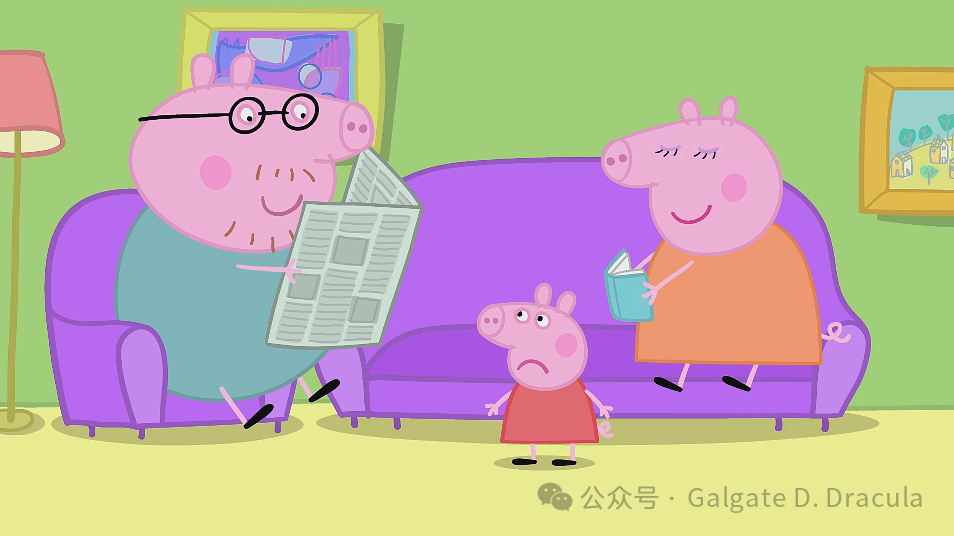
Daddy, I can't find George anywhere. Oh, dear. I wonder where he can be. Actually, I think there's something about George in this newspaper.
爸爸,我哪都找不到乔治。哦,这样啊,我想我知道他藏在哪了。你来看看,这报纸上好像有点关于乔治的消息。
wonder:想知道、纳闷(表示心里在猜测),注意区分 wander 动词,表示“徘徊,闲逛“。wander around 表示“到处闲逛”。
actually:实际上,事实上(用于引出不同或出乎意料的信息)
I wonder where he can be. 主句:I wonder(我想知道)宾语从句:where he can be(他会在哪儿)。
there's something about ... 表示“有关于……的事”。
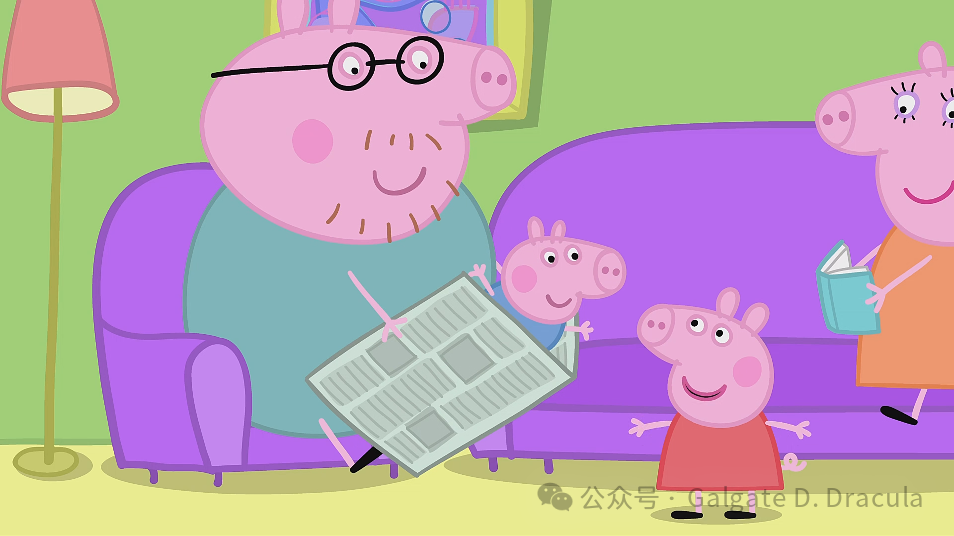
George, found you. Oh, George. That was a good place to hide.
乔治,我找到你了。哦,乔治那真是个玩捉迷藏的好地方。
That was a good place to hide. 中 to hide 作定语,修饰 place,表示“用来藏身的地方”。
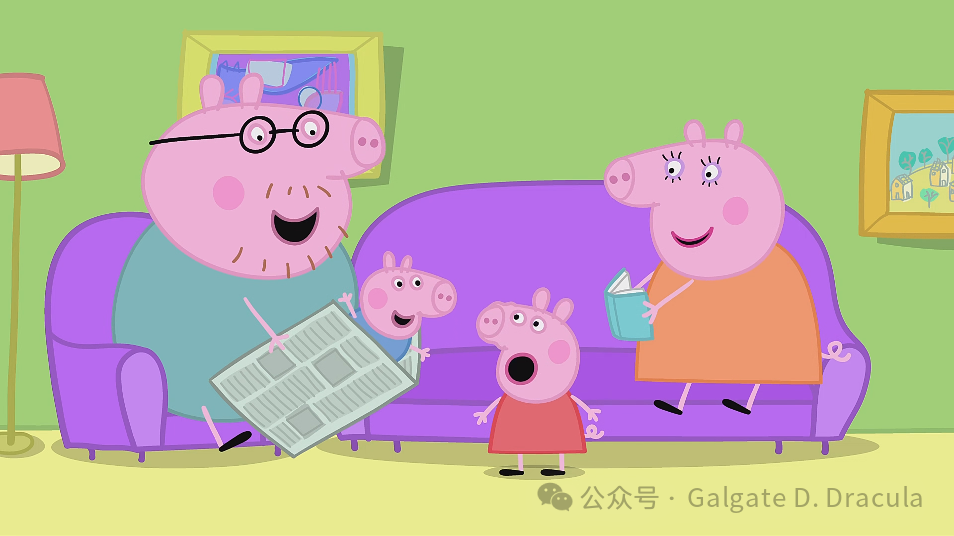
George was hiding behind Daddy Pig's newspaper all the time.
原来乔治一直藏在猪爸爸的报纸后面。
hide behind 表示“藏在……后面”。
all the time 意思是“一直;始终”。作状语,表示整个过程中持续发生。
本文链接:https://kinber.cn/post/5916.html 转载需授权!
推荐本站淘宝优惠价购买喜欢的宝贝:

 支付宝微信扫一扫,打赏作者吧~
支付宝微信扫一扫,打赏作者吧~


